Kick-off for Climate-Neutral Football
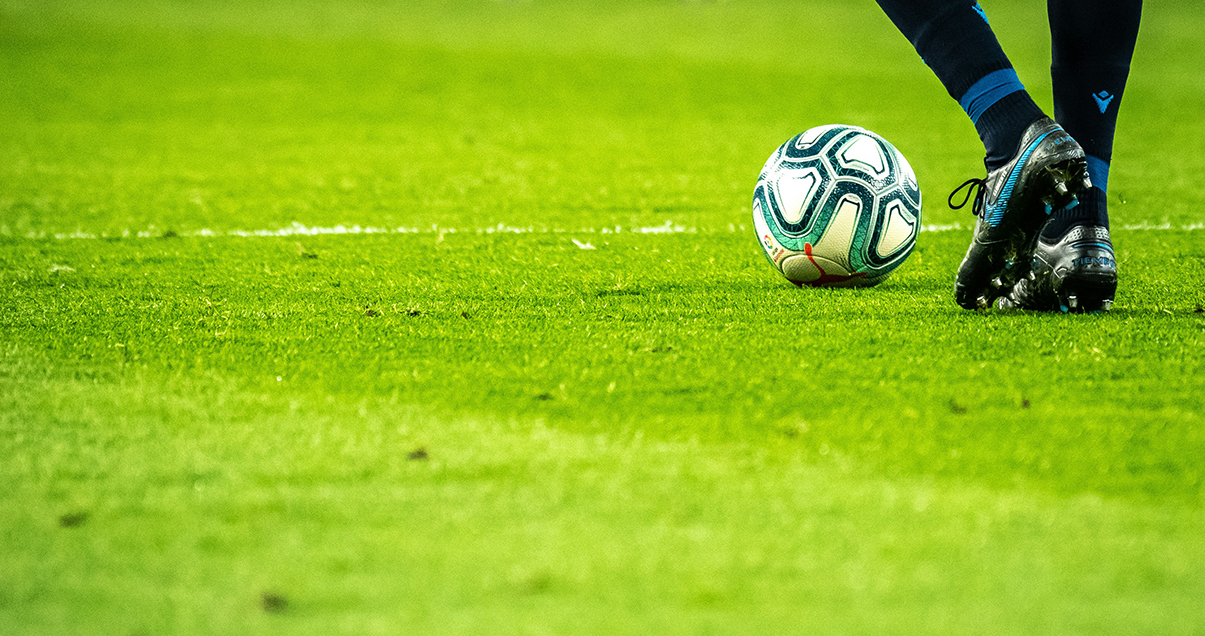
Sustainability and climate protection are becoming increasingly important in all areas of life – including in the world of professional football. In England and Spain, a number of clubs – both large and small – have already launched their own green initiatives. But elsewhere in Europe, the Bundesliga is leading the way.
When away fans at English football club Forest Green Rovers go to the bathroom, they are (in)voluntarily donating fertilizer. Mixed with seaweed, their urine becomes a mineral-packed “smoothie” for the stadium turf. But the fourth-division club is advancing its sustainability endeavors in other, even more radical ways too: All the catering and beer, for example, are vegan. The fourth-division club also covers its entire energy needs with photovoltaic systems mounted on the stadium roof, and even the lawnmower runs on solar energy. Fans can use charging points for electric cars, while the team itself travels to away games by electric bus. All this and much more made Forest Green Rovers, which is based in the tranquil town of Nailsworth in the west of England, the world’s first climate-neutral and vegan football club back in 2018.
Breaking with tradition
Club boss Dale Vince is a key driver of the green transition. The self-proclaimed hippie amassed a fortune with his green energy company Ecotricity and became a major shareholder in his favorite club in 2010. He says that football clubs need to be green role models and break with tradition in the process.
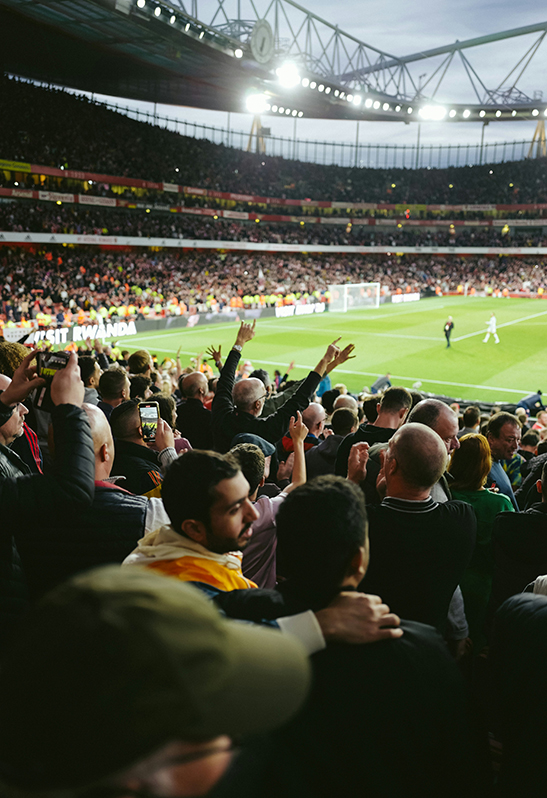
At Forest Green Rovers, for example, the classic stadium sausage is available only as a vegan version. All these measures make Forest Green Rovers not only an ambassador for green football but also an in-demand point of contact for major clubs. The English Premier League wants to become climate-neutral by 2040, and traditional clubs like Liverpool FC, Chelsea FC and Manchester United need to become more environmentally friendly.

Forest Green Rovers is paving the way, but now it’s time for the philosophy pursued by the fourth-division club to prove itself on a bigger stage. To see how this might work, let’s turn our attention to Germany.
60,000 trees for each match day
According to a model calculation, around 7,800 tons of CO2 are emitted on a Bundesliga 1 match day. The arrival and departure of fans and away teams in particular cause the emission of huge quantities of CO2, with many fans travelling by car and most teams preferring to take the team bus or plane instead of the train. It would take 60,000 newly planted trees every weekend to offset this amount of greenhouse gases. But match operations – the stadium lighting, pitch heating, catering and so on – are also extremely energy-intensive. In addition, several thousand liters of water are used for sanitary facilities, turf care and cleaning. And then there is the enormous mountain of waste that accumulates around and inside the stadiums.
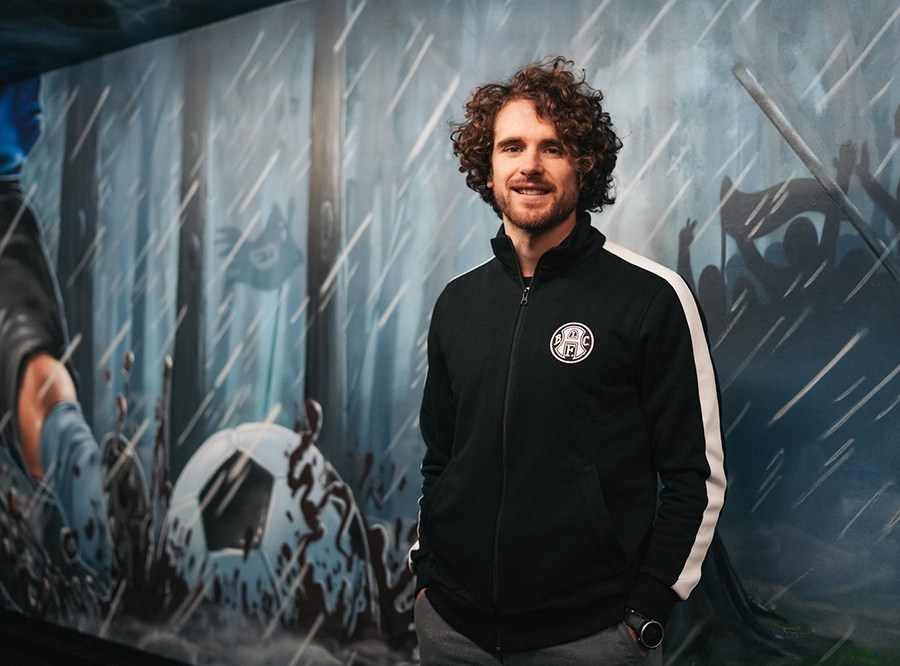 DSC Arminia Bielefeld
DSC Arminia BielefeldNevertheless, “When it comes to sustainability, the Bundesliga plays a pioneering role in Europe,” said professional football player Maël Corboz. The 29-year-old American plays as a central midfielder for Arminia Bielefeld and is CEO of elevengreen, a company that aims to bridge the gap between sustainability and football and advises clubs and sponsors on their sustainability efforts. Many German professional football clubs are taking a range of steps to cut their carbon footprint. Borussia Mönchengladbach, for example, offers its fans free public transport tickets and shuttle services. Borussia Dortmund has installed charging stations for electric cars in its stadium parking lot. Schalke 04 offers a range of vegan food options and secured the title of the most vegan-friendly Bundesliga stadium in the PETA ranking for the fourth time in a row. TSG Hoffenheim uses rainwater to flush its toilets and even plans to soon operate the first “zero-waste” stadium and save up to 500,000 disposable cups every season. With its “Fortuna for All” initiative, second-division club Fortuna Düsseldorf offers free admission to home games, demonstrating its commitment to social sustainability in what is otherwise a highly profit-driven business.
Unused roofs
“The Bundesliga still has room for improvement when it comes to reducing its carbon footprint,” said Corboz. Solar energy is an important step toward climate neutrality, because many clubs have plenty of space for photovoltaic systems on their stadium roofs. With its 2.4 megawatt system, for example, SC Freiburg’s new Europa-Park Stadion has the biggest solar roof of any football stadium in the world. The Olympiastadion in Berlin, which is home to second-division Hertha BSC, is also a flagship project for solar power in Germany, with 1614 solar modules adorning the outer concrete ring of the stadium roof. Equipped with ten powerful Sunny Tripower CORE 1 units from SMA, the PV system generates up to 615,000 kWh of solar power annually and saves up to 225 tons of CO2 per year. This covers around one tenth of the club’s total annual electricity demand and the energy costs for ventilation, cooling and stadium lighting. In the medium term, the system is to be expanded to include a number of battery-storage systems, making solar energy available around the clock – even during floodlit matches. “The integration of a PV system on the roof of somewhere like the Berlin Olympiastadion demonstrates how a sustainable energy supply can be put into practice. Thanks to its exposed location, the stadium roof is bathed in sunlight for most of the day, while its large, unused surface provides an ideal location for PV modules. Intelligent energy management ensures optimal utilization of green electricity. This is a great example of the potential of solar solutions in an urban environment,” said Jörg Schuster, Sales Engineer at SMA Solar Technology AG.
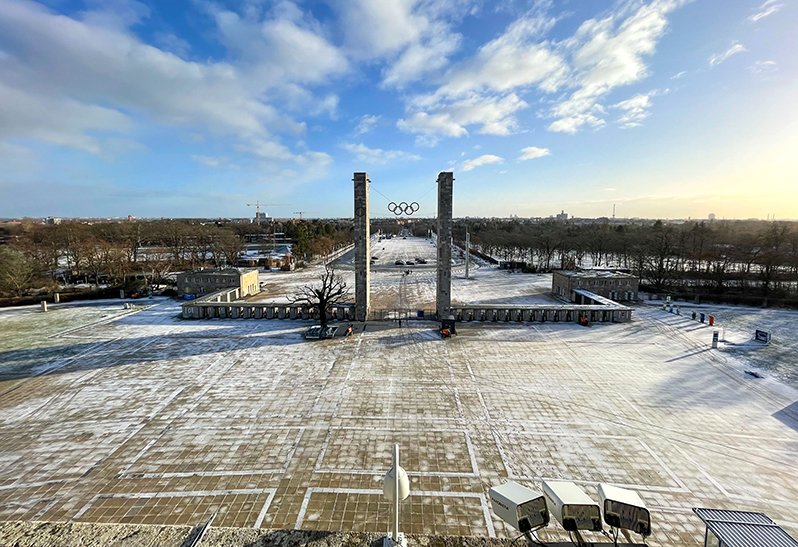 Solarwatt GmbH
Solarwatt GmbH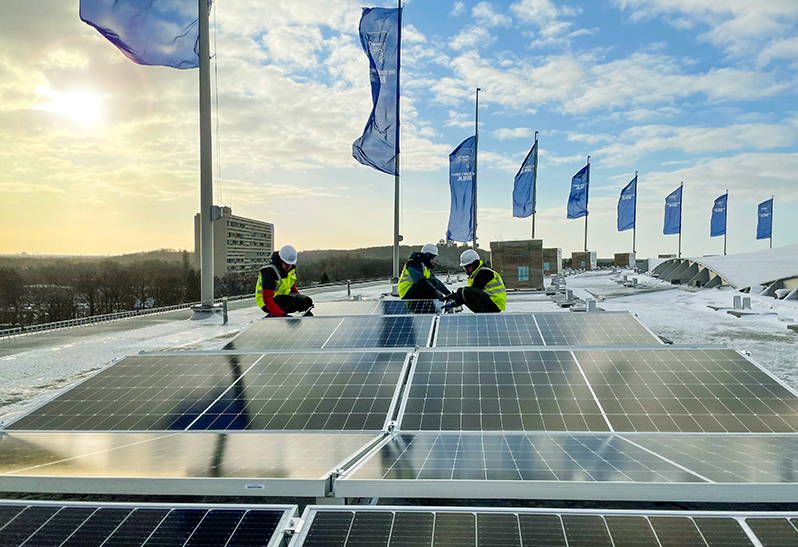 Solarwatt GmbH
Solarwatt GmbHThe Bundesliga leads the way
In addition to these club-based sustainability endeavors, the Deutsche Fussballliga (DFL) also recently set an important milestone – and one with Europe-wide impact – when it presented its sustainability guidelines in May 2022, making Bundesliga 1 and Bundesliga 2 the first major professional football leagues subject to mandatory rules. As of the current 2023–24 season, all 36 clubs are required to fulfill numerous minimum criteria when it comes to environmental, economic and social sustainability. In addition to quantification of the carbon footprint, it also stipulates the annual measurement of water and energy consumption as well as an analysis of transportation and traffic. These requirements will be put to the test in the coming season and gradually tightened over the following years. In the future, clubs will be required to define their climate targets based on their measured data. “The DFL’s sustainability guidelines are an important step toward greater sustainability, but their implementation poses challenges for many clubs. Some clubs will have to invest a lot of money to meet the criteria,” said Corboz.
Regardless of the DFL criteria, a few clubs stand out with their ambitious environmental goals. FSV Mainz, TSG Hoffenheim, VfL Wolfsburg, 1. FC Köln and Arminia Bielefeld have already declared themselves climate-neutral – including thanks to CO2 compensation. Maël Corboz sees these measures as inspiring examples for other football leagues – and society as a whole: “Professional football plays an important role in society and has the power to positively influence our society when it comes to sustainability.”
“Professional football plays an important role in society and has the power to positively influence our society when it comes to sustainability.”
–Maël Corboz, professional football player

